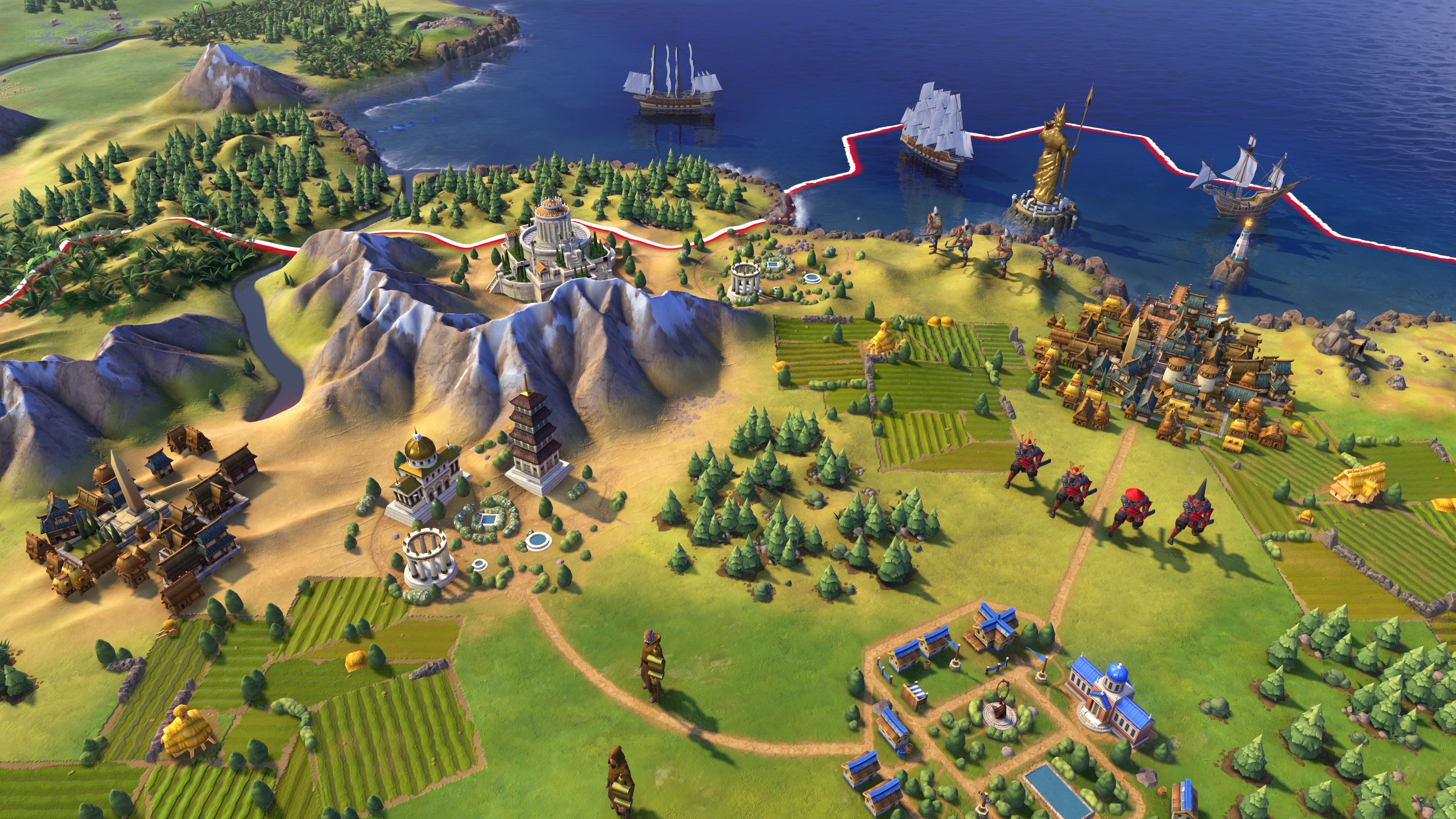 The trouble with reviewing a Civilization game is that they're always good.
The trouble with reviewing a Civilization game is that they're always good.
From the 1991 original through to today, Civilization games have all shared the same core design ideas. 2K's marketing will try and sell you on new stuff all they want, but the nuts and bolts of this game are the same as they've always been, and the same as they'll probably always be, and they're what really makes Civ great. You take turns, you build cities, you research tech, you fight.
Those elements are the heart of the series' famous "one more turn" appeal, and it seems that over the decades whatever form they've been presented in, whatever tweaks and changes have been shuffled around at the periphery, the heart of the game has remained as strong and enjoyable as ever.
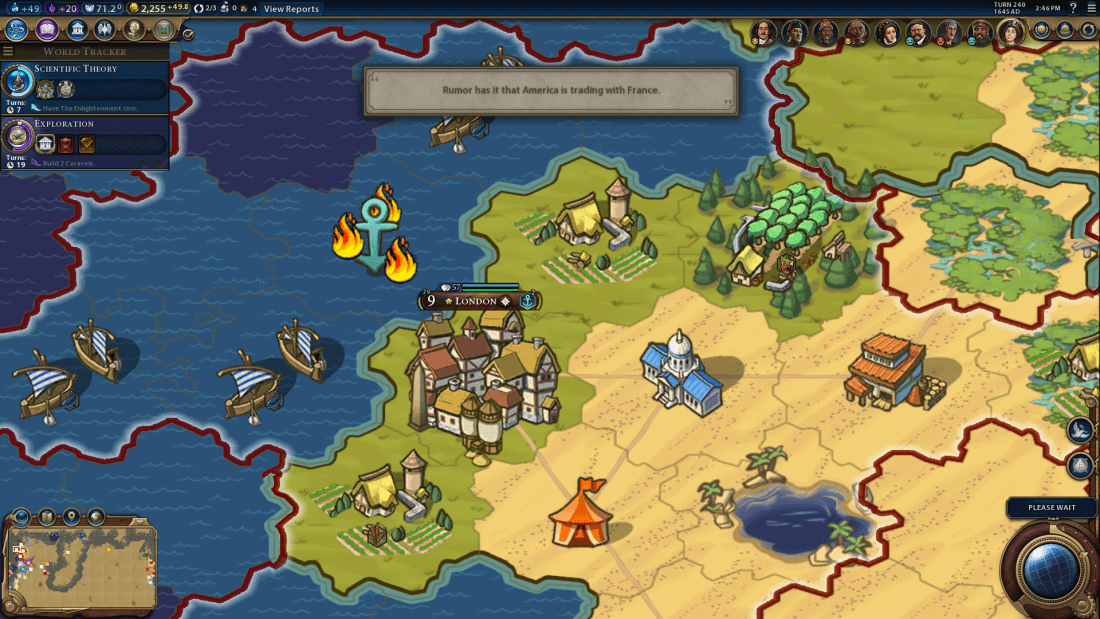
It's been six years since the last full Civilization game was released. Six years! That's a record between appearances for the series. It's so long we had enough time to review Civilization V twice.
That means the team at Firaxis have had six years to study the game that came before this one. Learn what made it ticked, see what worked, what was successful and what wasn't. Then take all that and build something new and improved on top of it.
For the most part, they've succeeded though I wonder, now that Civ VI is finally out, whether they might have been looking at it too long.
Despite what I just said above about the series' dependable roots, there's a lot of new stuff here in Civilization VI to shake things up. Most of it is good, some of it is not, some of it might have been good if it was explained better. The main things you need to know are:
- There are now things called Districts, which basically mean that important city buildings are now built out onto the world map instead of huddling inside your settlement's walls. So your barracks, theatres and libraries now exist on individual hexes on the map itself, where they both gather bonus abilities with their placement (either by drawing on neighbouring Districts or resources) and lie vulnerable to enemy sabotage and attack.
- The tech tree has been broken up. You now have two of the things, one researching standard tech (pottery, battleships), mostly related to things you build, the other called Civics, which is for the research of ideas.
- Government and ideology have been completely overhauled. You now get a ton of things called policies over the course of the game, which are basically perk cards that you attach to your current form of government. Each policy gives you a particular bonus or ability, whether in combat, research, production, etc. Different forms of government allow for different numbers and variety (military, diplomatic, etc) of policies.
Those are the main things you need to know. There are some other notable changes, some of which I'll get to below, others which don't really warrant a mention, but yeah, there's loads of new stuff here. This isn't just Civ V with fancier leader screens. Though the leader screens are now fancy.
That's a trend that follows through to the rest of the game's visuals. There's a toy-like joy to Civ VI, from the colour palette to the cute little unit designs, and despite all the hours I've ploughed into the game so far, I cannot stop looking at all the adorable little touches and flourishes scattered throughout its world.
Speaking of joy, the game's new happiness system knows how to make me, well, happy. I hated the way it was implemented in Civ V, with its global factors and its restrictive influence on your empire's growth. Those are both gone now, replaced with a city-by-city system that weighs each settlement's size, facilities and needs and determines whether their citizens are happy or not. It's a lot more chilled, so anyone frustrated by their constant happiness handicaps in Civ V will be thrilled with this.
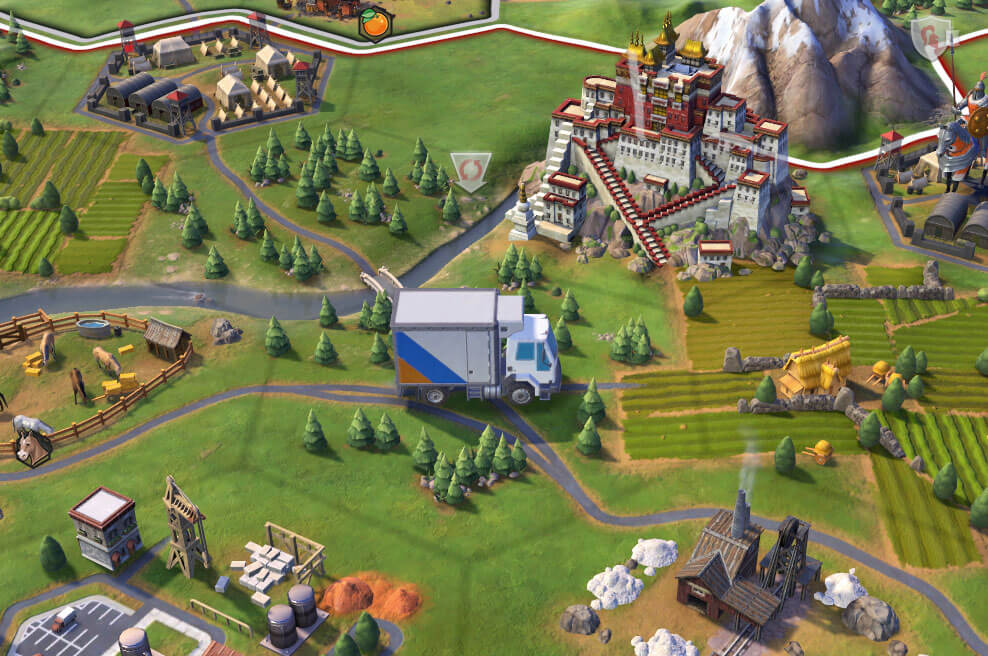
Also cool are the game's new workers. They no longer build roads, sparing you from that tedium, as that important work is left to trade routes (and later, Military Engineers, a new unit). Instead, you use them to construct improvements like farms, only now there's a catch: each Builder can only be used a small number of times before they're gone. So plan and use them wisely.
Civilization V was a good game at launch which then became something special through its two big expansions. That's a big legacy to live up to and a solid foundation to build off, but at times in Civ VI it feels like Firaxis worked too hard at improving Civilization V, and lost sight of some of the finer points of the game's hidden fundamentals.
There are systems in Civ VI that seem fantastic (and which are integral parts of the overall experience), like trade and religion, but which go woefully under-explained by both prompts and tutorials, and thus go underutilised until you bury yourself in FAQs and tips, which is very unlike Civ.

There are menu screens---like diplomatic actions---which are important to the game and which you have to get through a lot over the course of 50-5000 hours, but which take 2-3 too many clicks to skip and dismiss.
There are important milestones that you reach as a player, like moving into a whole new technological era, which are just kinda glossed over by the game, briefly flashing up a message before moving on. If you'd got up to get a cup of tea, you'd have missed it, then struggled to find the information somewhere else.
These might seem like minor little problems, but they speak to a larger concern I have with the game, and it's that for all its focus on its visuals and new systems, some of Civ's trademark polish has been left out. An attention to detail that makes every aspect of the game feel important and worthwhile, which permeated every corner of Civ V and helped make it a classic, and which isn't quite there in Civ VI.
I also found diplomacy itself to be a step backwards, with leaders contacting me less often and with both more simplistic and more manic reactions to my decisions (not helped by the fact it's now harder to keep tabs on which political ideology each Civ is adhering to). Example: Trajan's repeated insistence (across games!) that I'm losing money, to the point where he once declared war on me, even though my bank balance was never in the red. Or China's Qin Shi Huang spending thousands of years being upset that he had less wonders than me, regardless of countless other political and ideological factors.
I guess what I'm getting at with all this is that, having been spoiled by Civ V's polish and near-perfection for years, it's a timely reminder that this game too will need some work, and these are the areas---along with bizarre AI behaviour like stockpiling early-era units---it will need it the most.
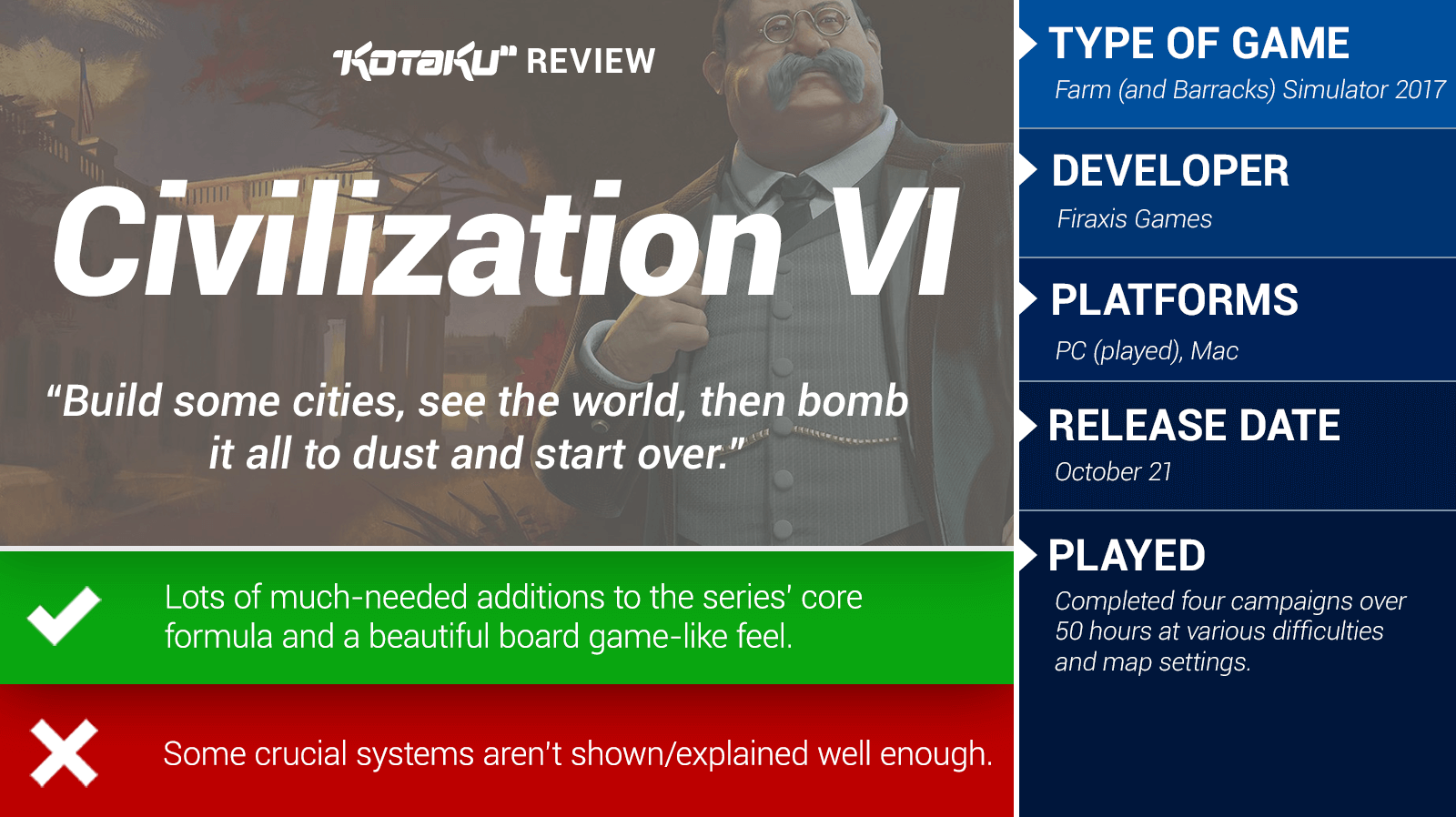
Like I said up top, though, the foundations here are good, and none of those annoyances I just mentioned can derail what it still a terrific strategy experience.
Most of the game's new ideas are all geared towards the same objective: Civ VI wants you to be able to run your Civ however you like, whenever you like. Policies and governments can be swapped out depending on which perks will benefit what you want to do, and the District system allows for a form of superficial urban planning that increases the degree to which individual cities can specialise. Conversely, this also allows you to adapt your style of play to suit whatever the game throws at you in terms of map generation.
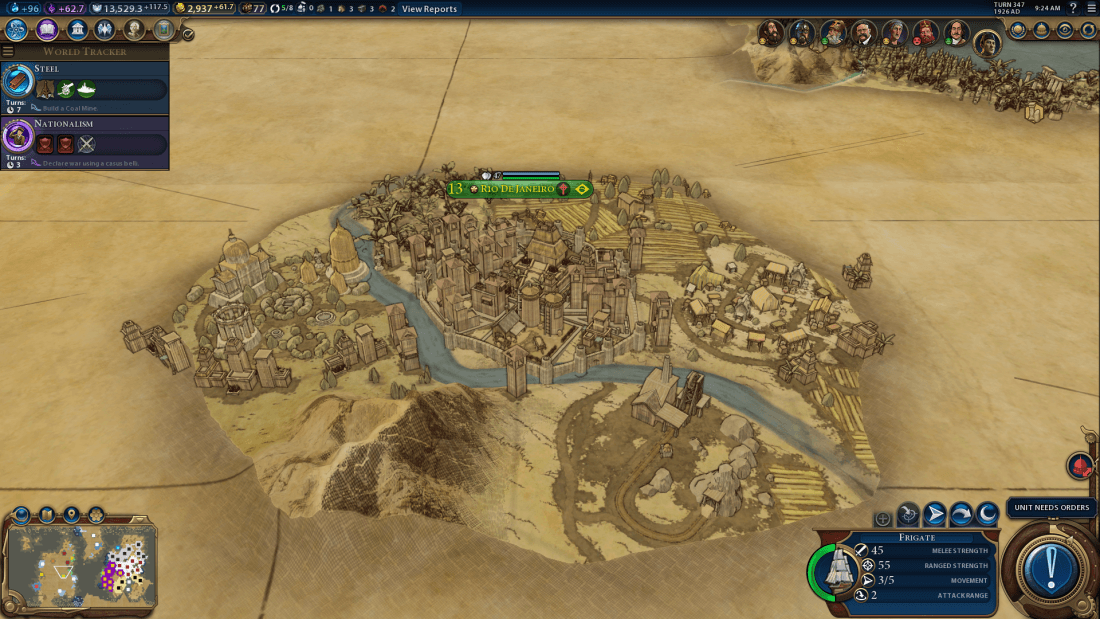
It's a much greater degree of freedom than you've had in previous games, and it takes a while to get used to, but once you get your civics and policies and districts down, you'll see that you're free here to really twist the whole game to suit the way you want to approach it. And it's a lot of fun, as it easily lets you experiment with play styles and approaches to scenarios that you might not otherwise have dabbled in.
Civ VI's new stuff is also trying to solve what has long been the series' biggest problem: there's not much to actually do. With automated exploring and building you can go years in previous Civilization games without ordering or moving anything, and as involving as the overall experience is, that's always been a lull.
Now your Builders need your constant attention. Your policies have been designed to be constantly tinkered with and swapped out. Barbarians seem more active, requiring more hands-on efforts to contain them. Your Districts don't just need to be built, they need to be planned. None of these new responsibilities entirely solves the problem, but they at least make a dent in it, and I found my time with Civ VI to be far more interactive than any previous game.
Which fits with an underlying itch you feel throughout the whole game: that it's a bit more board gamey than usual. This makes sense! Before working on Civ V's expansions, lead designer Ed Beach was a board game designer, and there are times where you feel this seeping through into Civilization VI.
It wants you to be more direct with it, more literal, taking things that used to live in menus and putting them on the map itself, making you move things around that used to be automated. This makes Civ VI feel more tangible, like you're more grounded in the land you're lording over. As someone who is very into board games, I love it.
Civilization VI has issues in unexpected places, but only a catastrophe was going to stop this being a real good time. And this is no catastrophe. What we've got here is a strategy game that, while preserving most of the series' longtime fundamentals, has also found new and surprising ways---through an investment in player choice and more hands-on time with your people---to keep things interesting.
Because every Civ VI game you start now is different. Your map will be different, your policies will be different, the way you need to build your districts will be different. I played Civ V for way too long, and that was a game in which I spent years entrenched in my established strategies, doing the same things over and over, and even then I was still having fun with it. Civ VI, which is already building upon what made Civ V so great anyway, forces you to adapt and play differently each time depending on your map and policies, so...yeah, we could be in for a long, fun ride with this one.
